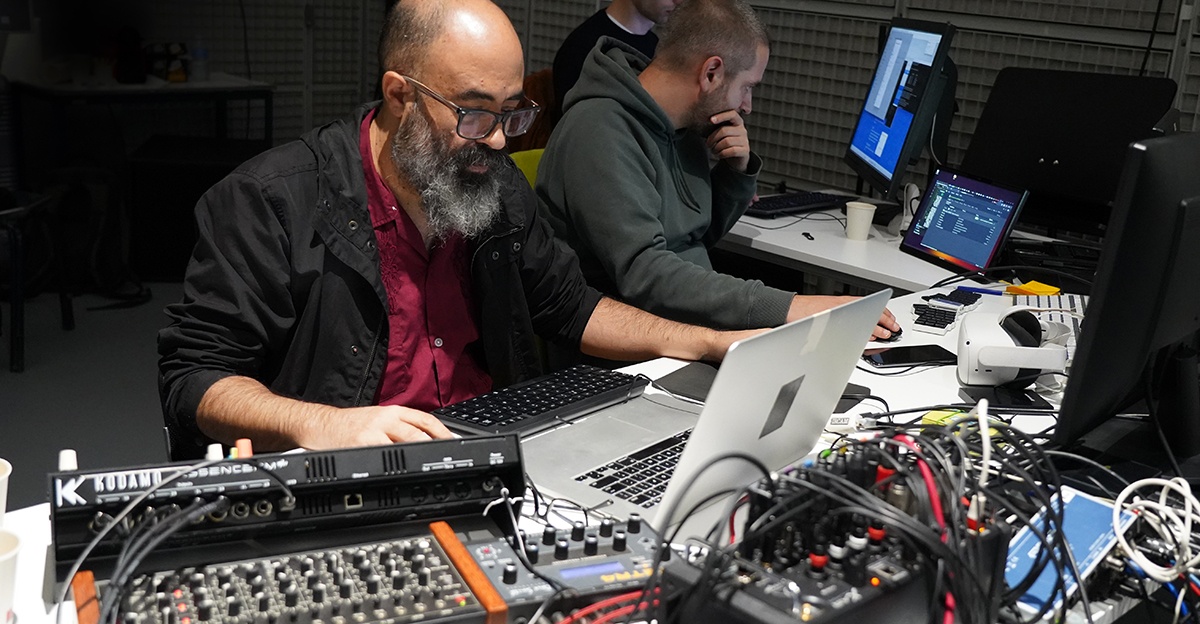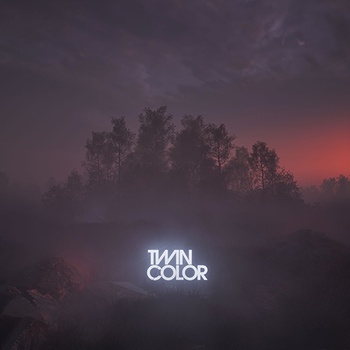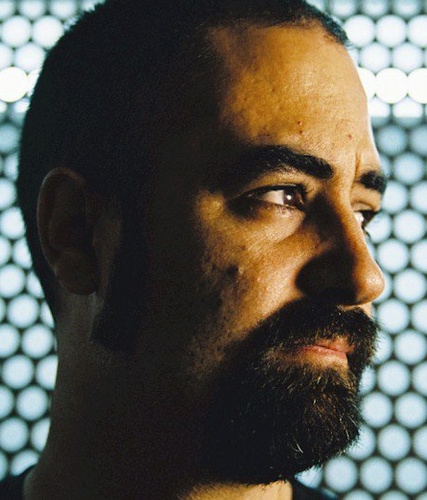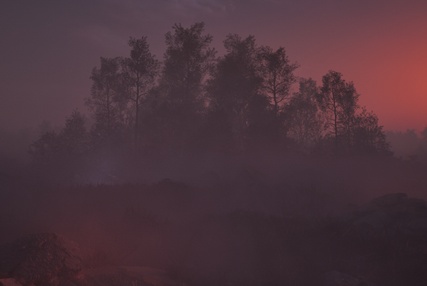Murcof en studio
S’approprier le jeu vidéo - Enjeux artistiques
Ce projet Twin Color s’inscrit dans le cadre de la collaboration au long cours entre le musicien électro Murcof et l’artiste visuel Simon Geilfus, initiée voilà plus d’une décennie. Déjà, dès la fin de leur précédent projet commun, au milieu des années 2010, les deux hommes caressaient l’idée d’incorporer à leur travail un moteur de jeu – ou « Game Engine », c’est-à-dire un ensemble de composants logiciels utilisés par les jeux vidéo pour tous leurs calculs de géométrie et de physique afin de simuler, en temps réel, la souplesse et la fluidité du monde imaginaire dans lequel se déroule l’action.

Murcof et Simon Geilfus en studio à l'Ircam © Ircam-Centre Pompidou
« Nous avions même fait dès cette époque des expériences avec un moteur de jeu que Simon était en train d’élaborer personnellement, se souvient Murcof, mais ça n’a pas abouti. Après quoi Simon s’est installé aux États-Unis. De mon côté, j’ai été pris par d’autres projets, et on en est restés là. »
Jusqu’à ce que les liens noués par le label Infine, qui suit Murcof depuis 2009, avec l’Ircam donnent au duo l’occasion d’explorer à nouveau le sujet. « Simon et moi avions repris langue depuis environ un an, et nous envisagions de collaborer à nouveau, reprenant le travail là où nous l’avions laissé. Les prémisses étaient déjà posées, il s’agissait surtout de remettre les choses au clair et de commencer à travailler concrètement. »
« Artistiquement parlant, le concept est simple : nous aspirons à créer un monde dynamique et réactif, produit par des processus implémentés dans le logiciel open source de génération d’images en 3D « Unreal Engine ». Ce monde consiste principalement en des biomes d’après nature, comme des forêts, des champs, etc. qui sont intrinsèquement liés et articulés avec la musique. Au sein de ces environnements, toute sorte de phénomènes se produisent, dans une atmosphère de science-fiction inspirée en partie des œuvres de Simon Stalenhad, David Lynch et quelques autres. »
L’intégration d’Unreal Engine dans le mélange logiciel utilisé par le duo s’accompagne nécessairement d’une réflexion sur la spatialisation du son – afin que non seulement le discours musical, et plus largement sonore, s’accorde aux évolutions en 3D des images générées. Ce projet, qui trouvera une première incarnation dans l’Espace de projection les 30 novembre et 1er décembre, est appelé à se poursuivre et à évoluer au fil du temps.
Compatibilité, fluidité et spatialisation - Enjeux technologiques
Si ce projet Twin Color est le premier mené par Murcof à l’Ircam, les outils développés dans les sous-sols de la place Stravinsky ne lui sont pas étrangers : « Par le passé, dit-il, j’ai fait de brèves incursions sur Max, par exemple, pour un album produit sous un autre alias, Terrestre, intitulé Secondary Inspection (2003). Plus tard, à la fin des années 2010, j’ai utilisé Trax et Verb pour du design sonore. Depuis quelques mois, je me plonge aussi dans les outils de synthèse sonore et de traitement de la voix. »
Cependant, l’essentiel de son travail se fait pour l’heure sur Ableton Live : « J’ai tendance à utiliser principalement l’audio et le midi natifs d’Ableton Live ainsi que les outils Max For Live et autres effets au sein de Live pour tout ce qui concerne le design sonore, afin d’éliminer toute éventualité d’incompatibilité d’un système à l’autre. »
 Dans le cadre de ce projet en particulier, la nécessité de penser une spatialisation en temps réel, et en conjonction avec les images générées par Unreal Engine, impose de mener deux sessions Live simultanément : l’une principalement pour le travail purement musical, et l’autre pour l’environnement sonore (vent, pluie, tonnerre, etc.) – lequel est donc directement lié à l’image, à la fois pour sa nature et pour sa répartition dans l’espace : cette deuxième session Live reçoit ainsi d’Unreal Engine des données telles que la position ou les mouvements de la caméra, afin de correctement rediriger les sons produits dans l’espace où se déroule la performance.
Dans le cadre de ce projet en particulier, la nécessité de penser une spatialisation en temps réel, et en conjonction avec les images générées par Unreal Engine, impose de mener deux sessions Live simultanément : l’une principalement pour le travail purement musical, et l’autre pour l’environnement sonore (vent, pluie, tonnerre, etc.) – lequel est donc directement lié à l’image, à la fois pour sa nature et pour sa répartition dans l’espace : cette deuxième session Live reçoit ainsi d’Unreal Engine des données telles que la position ou les mouvements de la caméra, afin de correctement rediriger les sons produits dans l’espace où se déroule la performance.
Et c’est là que résident les deux principaux enjeux du travail à l’Ircam : faire en sorte que tout le dispositif fonctionne en dynamique avec Spat et les systèmes de diffusion de l’Espro. « Je me familiarise ces derniers temps avec Spat/Panoramix au quotidien dans mon studio personnel, et j’expérimente ainsi l’automatisation et la spatialisation en préparation de performances live, mais la contribution en la matière des scientifiques et techniciens de l’Ircam est essentielle. Ils conçoivent pour nous les outils nécessaires pour s’assurer que les sons atteignent leur destination, et que cela se fasse dans les temps. Je travaille principalement avec Pierre Carré, pour configurer Max afin de contrôler l’automatisation et la spatialisation, mais aussi les paramètres de réverbération et le routage dynamique de sons au sein de Spat en temps réel. Les deux sessions de Live qui fonctionnent concomitamment communiquent beaucoup entre elles via MIDI/OSC, mais aussi avec Metasounds, Unreal Engine et les différents synthétiseurs. Des outils ont donc dû être implémentés spécialement dans ce but, que ce soit par Simon ou par Pierre. »
« D’autre part, Clément Cerles, ingénieur du son, m’aide à transposer fidèlement tout ce que nous imaginons avec Spat dans le dispositif de diffusion de l’Espro – car notre spectacle utilisera simultanément trois configurations systèmes différentes : le dôme Ambisonics 3D de 7e ordre, un anneau de 12 haut-parleurs en 2D enserrant l’espace, et un dispositif classique de diffusion frontale pour les sons les plus puissants et percutants. »
« Je pense que des ajustements seront encore nécessaires, jusqu’à 10 minutes avant la performance, conclut Murcof ! »




